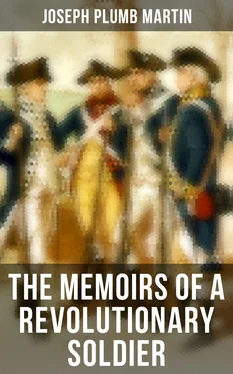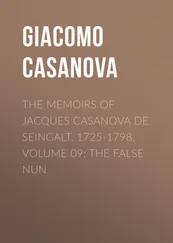Joseph Plumb Martin - The Memoirs of a Revolutionary Soldier
Здесь есть возможность читать онлайн «Joseph Plumb Martin - The Memoirs of a Revolutionary Soldier» — ознакомительный отрывок электронной книги совершенно бесплатно, а после прочтения отрывка купить полную версию. В некоторых случаях можно слушать аудио, скачать через торрент в формате fb2 и присутствует краткое содержание. Жанр: unrecognised, на английском языке. Описание произведения, (предисловие) а так же отзывы посетителей доступны на портале библиотеки ЛибКат.
- Название:The Memoirs of a Revolutionary Soldier
- Автор:
- Жанр:
- Год:неизвестен
- ISBN:нет данных
- Рейтинг книги:4 / 5. Голосов: 1
-
Избранное:Добавить в избранное
- Отзывы:
-
Ваша оценка:
- 80
- 1
- 2
- 3
- 4
- 5
The Memoirs of a Revolutionary Soldier: краткое содержание, описание и аннотация
Предлагаем к чтению аннотацию, описание, краткое содержание или предисловие (зависит от того, что написал сам автор книги «The Memoirs of a Revolutionary Soldier»). Если вы не нашли необходимую информацию о книге — напишите в комментариях, мы постараемся отыскать её.
Contents:
Campaign of 1776.
Campaign of 1777.
Campaign of 1778.
Campaign of 1779.
Campaign of 1780.
Campaign of 1781.
Campaign of 1782.
Campaign of 1783.
The Memoirs of a Revolutionary Soldier — читать онлайн ознакомительный отрывок
Ниже представлен текст книги, разбитый по страницам. Система сохранения места последней прочитанной страницы, позволяет с удобством читать онлайн бесплатно книгу «The Memoirs of a Revolutionary Soldier», без необходимости каждый раз заново искать на чём Вы остановились. Поставьте закладку, и сможете в любой момент перейти на страницу, на которой закончили чтение.
Интервал:
Закладка:
Another affair which transpired during and after the abovementioned engagement, deserves to be recorded by me, as no one else has, to my knowledge, ever mentioned it. A sergeant belonging to the Connecticut forces, being sent by his officers in the heat of the action, to procure ammunition, was met by a superior officer, an Aid-de-camp to some General officer, (I believe,) who accused him of deserting his post in time of action. He remonstrated with the officer, and informed him of the absolute necessity there was of his obeying the orders of his own officers; that the failure of his procuring a supply of ammunition might endanger the success of the day; but all to no purpose, the officer would not allow himself to believe him, but drew his sword and threatened to take his life on the spot if he did not immediately return to his corps. The sergeant, fired with just indignation at hearing and seeing his life threatened, cocked his musket and stood in his own defence. He was, however, taken, confined and tried for mutiny and condemned to be shot. The sentence of the court-martial was approved by the Commander-in-chief, and the day for his execution set; when it arrived, an embankment was thrown up, to prevent the shot fired at him from doing other damage, and all things requisite on such occasions were in readiness; the Connecticut troops were then drawn out and formed in a square, and the prisoner brought forth; after being blindfolded and pinioned, he knelt upon the ground. The corporal with his six executioners were then brought up before him, ready, at the fatal word of command, to send a brave soldier into the eternal world, because he persisted in doing his duty and obeying the lawful and urgent orders of his superior officers, the failure of which might, for aught the officer who stopped him knew, have caused the loss of hundreds of lives. But the sergeant was reprieved, and I believe it was well that he was, for his blood would not have been the only blood that would have been spilt;—the troops were greatly exasperated, and they showed what their feelings were by their lively and repeated cheerings after the reprieve, but more so by their secret and open threats before it. The reprieve was read by one of the Chaplains of the army, after a long harangue to the soldiers, setting forth the enormity of the crime charged upon the prisoner, repeatedly using this sentence, "crimes for which men ought to die,"—which did much to further the resentment of the troops already raised to a high pitch. But, as I said before, it was well that it ended as it did, both on account of the honour of the soldiers and the safety of some others. I was informed that this same sergeant was honoured, the year following, by those who better knew his merits, with a captain's commission.
We remained here till sometime in the month of October, without any thing very material transpiring, excepting starvation, and that had by this time become quite a secondary matter; hard duty and nakedness were considered the prime evils, for the reader will recollect that we lost all our clothing in the Kipp's Bay affair. The British were quite indulgent to us, not having interrupted our happiness since the check they received in the action before mentioned, but left us at our leisure to see that they did not get amongst us before we were apprised of their approach, and that, in all its bearings, was enough. It now began to be cool weather, especially the nights. To have to lie, as I did, almost every other night, (for our duty required it,) on the cold and often wet ground, without a blanket, and with nothing but thin summer clothing, was tedious. I have often, while upon guard, lain on one side until the upper side smarted with cold, then turned that side down to the place warmed by my body, and let the other take its turn at smarting, while the one on the ground warmed; thus alternately turning for four or six hours, till called upon to go on sentry, as the soldiers term it; and when relieved from a tour of two long hours at that business, and returned to the guard again, have had to go through the operation of freezing and thawing for four or six hours more;—in the morning, the ground as white as snow, with hoar frost. Or, perhaps it would rain all night like a flood; all that could be done in that case, was, to lie down, (if one could lie down,) take our musket in our arms and place the lock between our thighs, "and weather it out."
A simple affair happened while I was upon guard at a time, while we were here, which made considerable disturbance amongst the guard and caused me some extra hours of fatigue at the time;—as I was the cause of it at first, I will relate it. The guard consisted of nearly two hundred men, commanded by a field-officer;—we kept a long chain of sentinels, placed almost within speaking distance of each other, and, being in close neighbourhood with the enemy, we were necessitated to be pretty alert. I was upon my post, as sentinel, about the middle of the night; thinking we had overgone the time in which we ought to have been relieved, I stepped a little off my post towards one of the next sentries, it being quite dark, and asked him in a low voice how long he had been on sentry; he started as if attacked by the enemy, and roared out, "who comes there?" I saw I had alarmed him, and stole back to my post as quick as possible. He still kept up his cry, 'Who comes there?' and receiving no answer, he discharged his piece, which alarmed the whole guard, who immediately formed and prepared for action, and sent off a non-commissioned officer and file of men to ascertain the cause of alarm. They came first to the man who had fired, and asked him what was the matter; he said that some one had made an abrupt advance upon his premises and demanded, "How comes you on, sentry?" They next came to me, inquiring what I had seen;—I told them that I had not seen or heard any thing to alarm me but what the other sentinel had caused. The men returned to the guard, and we were soon relieved, which was all I that wanted. Upon our return to the guard, I found, as was to be expected, that the alarm was the subject of general conversation among them. They were confident that a spy or something worse had been amongst us, and consequently greater vigilance was necessary. We were accordingly kept the rest of the night under arms, and I cursed my indiscretion for causing the disturbance, as I could get no more rest during the night. I could have set all to rights by speaking a word, but it would not do for me to betray my own secret. But it was diverting to me to see how much the story gained by being carried about,—both among the guard, and after its arrival in the camp.
I had been one night upon a piquet guard,—that is, a guard only for the night. Having been dismissed early in the morning, I was returning through a by-road to my quarters;—this road led from the main road to the shore of the North river; I was alone, the rest of the guard having, for some cause which I have now forgotten, passed on, and were out of sight. I saw Gen. Putnam on horseback and alone, coming up the road in my rear. In my front, and nearer to me than I was to the General, was a high fence and a set of high and very heavy bars, composed of pretty large poles or young trees. I had only just to go through the bars and cross another fence on my left, and I should be in the deep gully and at the very spot where the late action began;—this was the way I was actually to go to reach the camp. The General seeing me near the bars, bawled out, "Soldier, let down those bars." I was then at the bars, but seeing that the General was some distance off, I took down one bar, and slipped through, leaving him to let down the bars himself. He was apparently in a dreadful passion; drawing a pistol from his holsters, he came after me to the bars, with his usual exclamation,—"curse ye!"—but I was where he could not see me, although I could see him, and hear him too;—I was safe, and perhaps it was well for me that I was; for I verily believe the old fellow would have shot me, or endeavoured to have done it, if he could have got within reach of me. Thus was my life twice threatened by him, here, and at the wine-cellar in New-York; but I was not much afraid of his putting either of his threats into execution.
Читать дальшеИнтервал:
Закладка:
Похожие книги на «The Memoirs of a Revolutionary Soldier»
Представляем Вашему вниманию похожие книги на «The Memoirs of a Revolutionary Soldier» списком для выбора. Мы отобрали схожую по названию и смыслу литературу в надежде предоставить читателям больше вариантов отыскать новые, интересные, ещё непрочитанные произведения.
Обсуждение, отзывы о книге «The Memoirs of a Revolutionary Soldier» и просто собственные мнения читателей. Оставьте ваши комментарии, напишите, что Вы думаете о произведении, его смысле или главных героях. Укажите что конкретно понравилось, а что нет, и почему Вы так считаете.












